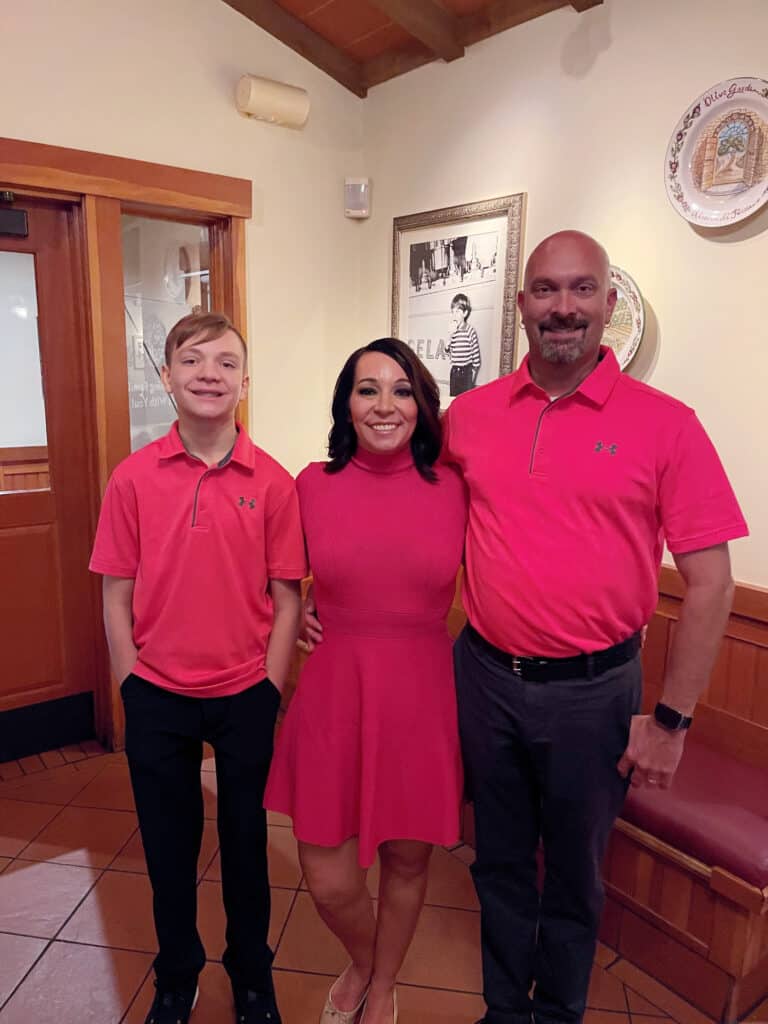
Stacy Scovanner knew as soon as she felt a lump near her armpit that she had breast cancer. Two weeks later, follow-up tests confirmed her suspicions were correct. She was diagnosed with a rare form of breast cancer called low-grade fibromatosis spindle cell carcinoma in June 2020 at 42 years old.
The diagnosis didn’t come as a surprise in part due to her family history of breast and ovarian cancer, which prompted her to get genetic testing in her mid-30s. She tested positive for the BRIP1 gene mutation, which is linked to a higher risk of breast cancer in women.
“When I was diagnosed with such a rare form of breast cancer, I basically planned my funeral,” Stacy said. “I didn’t know what to do. I needed my son to be taken care of. I told my husband everything that needed to be done.”
Stacy underwent six surgeries in nine months, including a double mastectomy and total hysterectomy, and completed what she hopes will be her seventh and final surgery in October 2022.
“When you go through treatment, you don’t realize how you really need people, and you need support, especially when you’re down in the dumps,” Stacy said. “I tried to play it off like I was doing great. I just wasn’t. After I had a hysterectomy, I spiraled out of control. I couldn’t focus on who Stacy was anymore. I just needed help.”
Stacy was referred to an oncology therapist who has helped her immensely, especially as she considers her high chance of recurrence due to her type of cancer. She continues to have regular therapy appointments and wants other survivors to know that seeing an oncology therapist can be a powerful way to find healing.
“I have been living my life again and doing things I never thought I would ever do,” Stacy said. “My therapist taught me how to say, ‘It’s OK to feel the way I feel,’ and that it’s OK to be mad because I am mad. I did everything right for my body. I was a runner. I never smoked. I never did drugs. I barely ever drink. All of the anger and all the emotions just took me for a ride.”
Stacy joined a Facebook group for breast cancer survivors in search of other people struggling with the emotional impact of diagnosis and treatment. She wishes more people could understand the true emotional toll the disease takes.
“I wish people would talk about the physical and mental health aspect of having breast cancer,” Stacy said. “People do not realize how hard it is. My friends think I should be bouncing back, but I’m not. I’m exhausted still. I have endless doctors’ appointments still. People don’t understand that.”
She decided to volunteer for the Susan G. Komen Kentucky MORE THAN PINK Walk as another way to connect with survivors. She was a speaker for the 2022 walk in Louisville a month before her seventh and final surgery and will serve as chair of the walk in 2023.
“Participating in the walk is also therapy for me,” Stacy said. “You feel validated when you’re around other people who have battled this. If I can help someone understand that what they are feeling is OK, it makes me happy. I love helping people. It makes me feel good to be there and offer support.”
Stacy also wants to elevate the conversation about emotional support for caregivers, as she has seen firsthand the toll her diagnosis and treatment have taken on her parents; her husband, Drew; and her 13-year-old son, Nathan. Drew also visited the oncology therapist for support during Stacy’s recovery from surgery.
“Every time I had drains, Drew would not let my mom touch the drains. He drained me all the time,” Stacy said. “He would get up in the middle of the night to help me take my medications. He would wash my hair and shave my legs. He had to bathe me after every single surgery for a week. He is just a phenomenal husband, but it hits him hard, too.”
Now in her second year of survivorship and with what she hopes will be her final surgery behind her, Stacy is embracing the gift of life with a newfound purpose and joy.
“I have a fear of flying, but since being diagnosed, I’ve been flying everywhere by myself,” Stacy said. “I went skiing for the first time last year. I started going to New York City with my best friend for the Tunnel to Towers race. I was on the “Today” show. Before being diagnosed, I would have never traveled by myself ever. But now I’m going to keep doing things I never thought I would do.”
You may feel stress, shock, fear, sadness, anger and grief after a breast cancer diagnosis. These feelings are normal. Some people find joining a support group or talking to a counselor or therapist helpful in coping with these feelings. You can request to join the Komen Breast Cancer Facebook group or call the Breast Care Helpline at 1-877-GO KOMEN to find support. You are not alone.
Statements and opinions expressed are that of the individual and do not express the views or opinions of Susan G. Komen. This information is being provided for educational purposes only and is not to be construed as medical advice. Persons with breast cancer should consult their healthcare provider with specific questions or concerns about their treatment.



